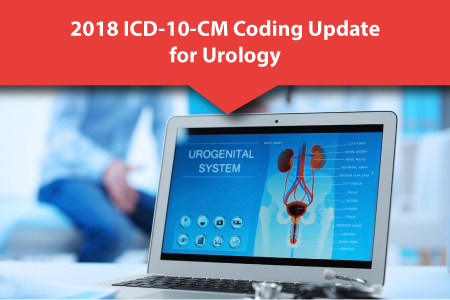If you deal with medical coding, you know that changes to the diagnostic codes happen regularly. On October 1, 2017, the Centers for Medicare & Medicaid Services (CMS) will implement the latest ICD-10-CM changes for your urology practice.
CMS has released information on the upcoming changes so that your urologists, PAs and NPs, along with the coders and billers in the office, can prepare.
Avoid Claim Denials
There’s nothing worse than leaving money on the table when it comes to reimbursement. When CMS releases coding changes, it’s to your advantage to stay in the know. Otherwise, you may face claim denials that cost your practice valuable revenue.
CMS’s new urology ICD-10-CM codes go into effect this October. Although small in number, there is no doubt these changes will affect diagnostic coding for urology. For example, there are new anatomical location codes for undescended testicles, and new complexities in uro-oncology coding. Coding for multiple urology procedures will likely continue to be an issue in 2018, especially when it comes to using modifiers -50, -51, -62, -80 and -82.
Anything your urology practice can do to stay on top of these coding changes will benefit you.
Brush Up on Coding Habits
It’s best practice to evaluate your existing urology coding procedures when you’re learning about new and modified ICD-10-CM codes. Go over important older concepts in diagnostic coding to ensure that you’re using the proper codes in every situation.
Corrective measures for your current diagnostic coding habits can also save your urology practice money:
- Are you applying the correct codes for each clinical scenario?
- Are you using the seventh character correctly in your ICD-10 codes?
- Do you understand the excludes 1 and excludes 2 diagnostic codes?
- Do you apply unspecified ICD-10 codes too often?
These are all important coding areas to review as ICD-10-CM faces changes in the fall and into 2018.
All-In-One Solution
Expert speaker Michael A. Ferragamo Jr., MD, FACS, gives you the latest on the upcoming urology coding changes for ICD-10 and will give you a refresher on older diagnostic coding concepts in ProfEdOnDemand’s “2018 ICD-10-CM Coding Update for Urology” audio conference so you can make sure to eliminate any coding habits that are hurting your practice. He will provide informative charts and tables to aid in understanding both past and new processes of diagnostic coding for urologists, non-physician providers, coders, billers, PAs and NPs. You’ll learn immediate steps to remain compliant with ICD-10 on October 1, 2017 and into the new year.


